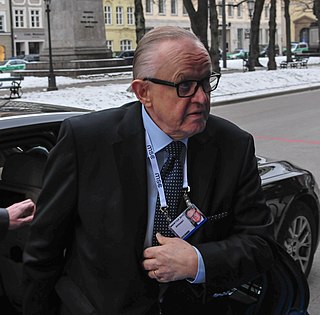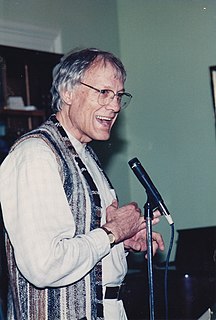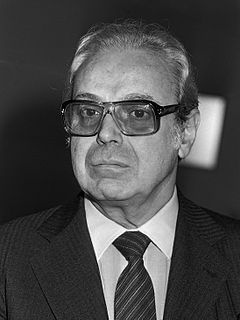A Quote by Martti Ahtisaari
The only people that can make peace are the parties to the conflict, and just as they are responsible for the conflict and its consequences, so should they be given responsibility and recognition for the peace.
Quote Topics
Related Quotes
Without inner peace, outer peace is impossible. We all wish for world peace, but world peace will never be acheived unless we first establish peace within our own minds. We can send so-called 'peacekeeping forces' into areas of conflict, but peace cannot be oppossed from the outside with guns. Only by creating peace within our own mind and helping others to do the same can we hope to achieve peace in this world.
I am for lasting peace... United, I believe, we can win the battle for peace. But it must be a different peace, one with full recognition of the rights of the Jews in their one and only land: peace with security for generations and peace with a united Jerusalem as the eternal, undivided capital of the Jewish people in the state of Israel forever.
Life, as we all know, is conflict, and man, being part of life, is himself an expression of conflict. If he recognizes the fact and accepts it, he is apt, despite the conflict, to know peace and to enjoy it. But to arrive at this end, which is only a beginning (for we haven’t begun to live yet!), a man has got to learn the doctrine of acceptance, that is, of unconditional surrender, which is love.
When you have a conflict, that means that there are truths that have to be addressed on each side of the conflict. And when you have a conflict, then it's an educational process to try to resolve the conflict. And to resolve that, you have to get people on both sides of the conflict involved so that they can dialogue.
Human nature being what it is, peace must inevitably be a relative condition. The essence of life is struggle and competition, and to that extent perfect peace is an almost meaningless abstraction. Struggle and competition are stimulating, but when they degenerate into conflict it is usually both destructive and disruptive. The aim of political institutions like the United Nations is to draw the line between struggle and conflict and to make it possible for nations to stay on the right side of that line.
I think the government must recognise that the wounds of conflict are even more grievous on the mind than the body, and indeed may even serve to fuel further conflict. Where conflict cannot be avoided, provision of adequate psychosocial services to prevent the adverse mental health consequences should take priority.
Don't look for any other state than the one you are in now; otherwise, you will set up inner conflict and unconscious resistance. Forgive yourself for not being at peace. The moment you completely accept your non-peace, your non-peace becomes transmuted into peace. Anything you accept fully will get you there, will take you into peace. This is the miracle of surrender.
The Russians as a people had no point of conflict with the Germans; the conflict came from their respective imperialistic policies. When the Russian people learned that imperialism was historically wrong, they set up a revolution in 1917 and overthrew imperialism at home. They then negotiated for peace separately with Germany.


































